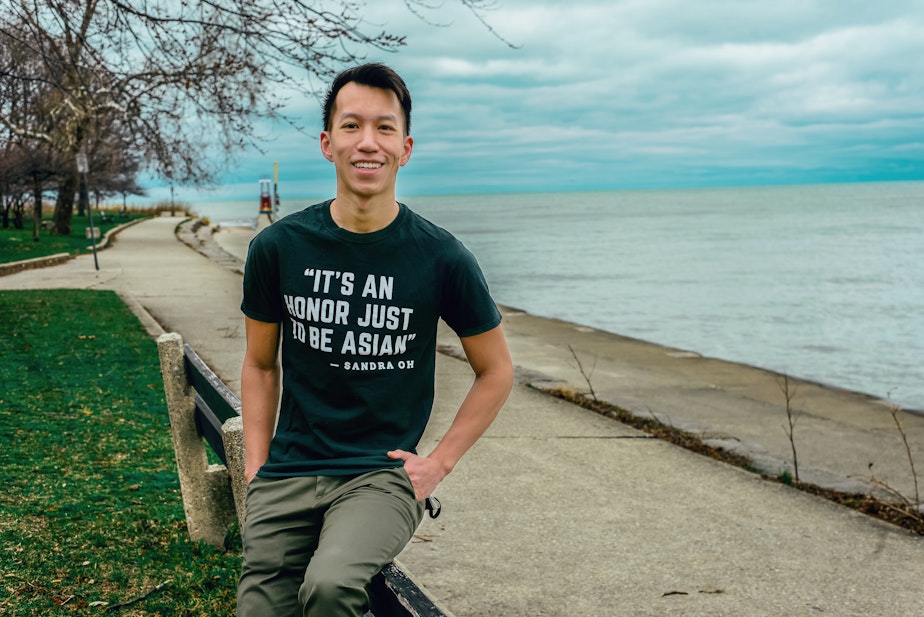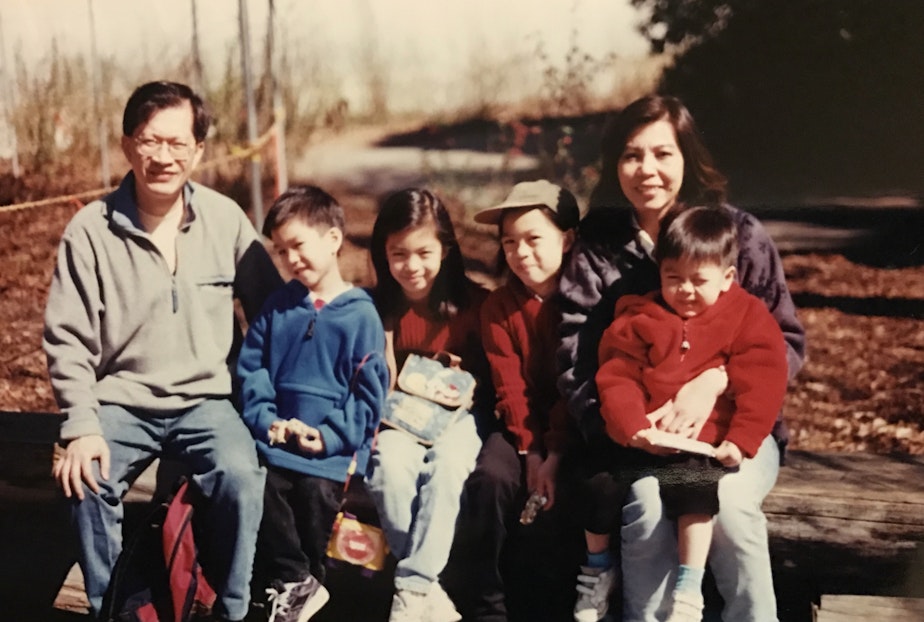'It's Simon, not Tran.' Bullied by a high school teacher, this Vietnamese writer found his voice

After struggling to embrace his culture and hiding his sexual orientation, Simon Tran finally found self-acceptance and the Asian ally he needed.
Growing up, we, the Tran family, made scenes in the grocery store.
My parents, three siblings, and myself, had discordant personalities with different ideas about which cheap snacks to buy. My younger, rambunctious brother would try to charm his way into getting the snacks he wanted. My sisters would get upset at my brother, which upset my dad because they were yelling in public. Our raised voices reverberated over to the nearby aisles where the older white ladies shopped quietly, staring at us.
We were embarrassing, sticking out as that unpleasant family. I wanted those white ladies to know that we were also articulate, well-mannered, and able to fit in. Once I walked over to the produce section where these white women stood, and loudly commented, “Oh it seems like the vegetables are on sale today,” hoping to appease their disapproving assessment of us.
I don’t recall my parents ever sitting my siblings and me down to say, “Hey, you’re Vietnamese. This is something you should be proud of.” And I've always wondered why they didn’t. My parents were Vietnamese refugees, sponsored to come to predominantly white towns in Washington state, who met later as adults. Perhaps there was never any space or time that organically lent itself to have that conversation with us.
My siblings and I, unlike our parents, were born and raised in a country that wasn’t predominantly Vietnamese. They grew up around the Vietnamese language, culture, and people. We grew up as Vietnamese-Americans in Olympia, Washington, unknowingly substituting the possibility of appreciating our heritage for the pursuit of being accepted by an environment that wasn’t at all like us.
Sponsored
Embracing our Vietnamese heritage didn’t come naturally for me and my siblings. Our exposure to Vietnamese culture were typically obligations. We attended Vietnamese school, spending several hours on our precious Friday nights in a musty Catholic private school classroom learning Vietnamese by uncertified teachers who spoke to us in Vietnamese. Our parents never said why we needed to go, other than we were expected to learn Vietnamese because we were Vietnamese.
My siblings and I retained nothing from those classes, bored from the old-fashioned teaching style and tired from a week of regular school. We didn’t know any Vietnamese prior to Vietnamese school, and we felt inauthentic compared to the other students. It was a piercing shame that we didn’t speak Vietnamese like our cousins, which only made us feel even worse, and discouraged us from learning. Vietnamese school was a waste of time, and so was trying to understand our own culture.

Paralyzed by the deficit of being unequipped in our culture, we as young Vietnamese-Americans tried our best to reclaim a space where we could control our outcome – at school with the white kids.
Sponsored
The kids in elementary school would have described me in three words: shy, impressionable, and girly. Early on, my sexual orientation consumed me more than my racial identity. I tried to excel in P.E. so that I wouldn’t be seen as weak, or worse – somehow even more girly. It was my fifth grade class that tested me the most. I had the misfortune of being in a class with several athletic boys who all would end up playing varsity sports in high school and even in college.
After constant attempts of trying to impress them, I was finally invited to join their group during free time in class. I can’t exactly remember how this happened, but one day, one of the boys decided to ruffle my hair (because the behavior of boys is playful but not like in a gay way, let’s be clear!).
“Wow, your hair feels really different, like a wig,” he said. My dark, coarse hair was a mystery to these white boys. One by one they took turns touching my hair, in disbelief that my hair was real. As a result, they affectionately called me “Wiggy.”
I embraced this nickname. I was just like them, except for my hair. This feeling of acceptance was surface-level, because this nickname never got me invited to their houses or birthday parties. But at least I was acknowledged. At least they knew that I was there.
Meanwhile, I dreamed of being a writer. Those at school who excelled in English could command a room with their creativity, sharp thinking, and self-awareness. They were the kids who were a different type of smart, and I wanted to be like them.
Sponsored
During my senior year of high school, I enrolled in the journalism class. I was quite nervous. I was the only Asian kid in the class, and I was surrounded by some of the best writers in my grade. I spent extra time working with the editor-in-chief on all of my drafts. She was patient, even when most of my writing didn’t make sense to her.
One evening, I got an email from the journalism teacher, out of the blue, asking if he could use one of my drafts as an example for class. He promised that he wouldn’t use my name. I agreed, feeling unexpected pride from in my writing. I was being acknowledged for something I wrote!
The next day, the journalism teacher used my writing example to demonstrate to the class what bad writing looked like. Referencing my draft as “Tran’s paper,” he pointed out all the grammatical errors. With his red pen, he circled misspelled words, crossed out confusing statements, and drew large question marks in the margins. As a class, we never gathered as a full group like this, and the journalism teacher decided to use my draft as the only example to dissect in front of my white classmates.
I sat through this 10-minute experience completely frozen, unable to move or look away or defend myself. This moment of public humiliation shattered my hopes of becoming a good writer. I’m sure some came up to me to say how mean that was, but I honestly can’t remember. I could barely look them in the eye, knowing that they knew that the only Asian kid in the journalism class was not a great writer.
Sponsored
But the worst part of this experience was how the journalism teacher said my last name again and again as he picked apart my writing, as if he purposely tried to incite an emotional reaction from me to prove that I was both bad at writing and weak in character.
“It’s Simon,” I nearly exploded, my voice breaking. “Not Tran.” I held back tears as I asked him to call me by my first name. How he pronounced “Tran” felt like a sneer toward my family, how I looked, how I sounded, how I wrote, how I tried but would never be good enough. “Tran” as my Vietnamese surname felt more of a liability than a source of pride, a dead weight that would mar my capability to write something good enough to expunge how the journalism teacher made me feel about myself.
For the rest of the year, I didn't give anyone the chance to see me fail. Never again would I let others read my writing unless it was absolutely perfect. As a result, I published little because I hardly wanted to write anything. I graduated and left for college, burying my deep dreams of ever calling myself a writer. If I was a horrible writer in high school, how could I ever become a good one in college?
Y
ears later, I walked into an introductory creative writing course at the University of Washington. Holding onto the deep shame of my writing proficiency, I sat in the back of the class so no one would guess that I struggled as a writer. The professor introduced her graduate students at the end of the class, which is when I noticed one of them for the very first time. A friendly woman, with dark brown hair and very warm eyes. She and I made eye contact, but there was something special about how we saw each other. This woman, who I will call Lisa, would be my teaching assistant, and I learned that she was half-Asian. Lisa was also the first Asian teacher that I had ever had.
Sponsored
She read my stories and wanted to learn about my family’s history. Her childhood was a lot like mine: growing up in an Asian family in what felt like in the middle of nowhere. People didn’t understand her. She tried really hard to separate herself from the Asian part of her family. I connected with this.
It’s a bit tragic that a lot of young Asian Americans grow up like this, carrying with us a dearth of embracing our own identities, a painful saga of self-acceptance. Lisa shared Asian American literature with me, stories hardly found in any of the unrefuted Western canons. These sources of writing allowed me to understand how our collective pain and experiences are valuable and extraordinary, setting myself on this path to reconcile what I actively rejected.
My parents may have not told me why I should be proud to be Vietnamese, but, in some ways, they couldn’t. I had to find the reasons myself.
Simon Tran is a Vietnamese American storyteller, writer, and actor originally from Olympia, Washington. You can learn more about his work at simontran.net.
This essay is part of KUOW's Seattle Story Project, our series featuring bold first-person reflections on life and resilience in the Puget Sound region. If you have a brave story to tell, reach out to us. Here's how. If you have feedback on this story, we're listening. Email us at engage@kuow.org or tag us in your tweets @KUOWengage.


